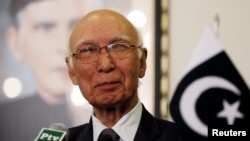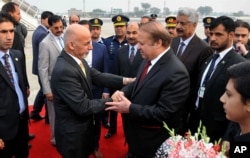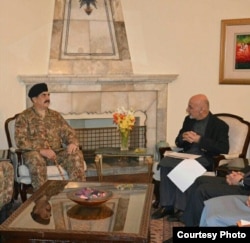Pakistan says it will host next month’s inaugural meeting of a recently set up four-nation “steering committee” to discuss when, how and where direct peace talks between the Afghan government and the Taliban could possibly be resumed.
The quadrilateral committee, which consists of officials from Afghanistan, Pakistan, China and the United States, “is being convened sometimes between January 10 and 15 in Islamabad and not Kabul," Sartaj Aziz, foreign policy adviser to the Pakistani Prime Minister, told reporters Wednesday.
He said the meeting will discuss ways to resume and sustain Afghan reconciliation talks, adding all stakeholders will have “a shared responsibility” to carry the peace process forward.
The announcement comes a day after reports quoted unnamed Afghan presidential officials as saying the committee would meet in Kabul in the first week of January.
Mullah Omar news scuttles talks
A preliminary round of Afghan reconciliation talks was held in early July in Pakistan. But the process was halted after revelations that longtime Taliban leader Mullah Omar had been dead for more than two years.
The disclosure prompted the Islamist insurgency to pull out of the talks until it resolved the leadership crisis while Afghan leaders felt betrayed and accused Pakistan of hiding the news of Omar’s death.
Islamabad accused elements within the Afghan government for leaking the news only to disrupt the peace process.
The allegations and counter allegations suspended months of improvement in bilateral ties until December when U.S. and Chinese diplomatic interventions convinced President Ashraf Ghani to visit Islamabad for the Heart of Asia regional conference, leading to the revival of bilateral ties.
Separately, top Pakistani and Afghan military commanders on Wednesday spoke for the first time through a newly established direct communication link between them called “hotline”.
Afghanistan, Pakistan relations
Pakistan army spokesman Lt. General Asim Bajwa said director generals of the two countries discussed “military-to-military issues, modalities and dates” for future bilateral meetings between senior military commanders.
Pakistan's military chief, General Raheel Sharif, traveled to Kabul on Sunday, where he discussed in detail the Afghan peace plans with both President Ghani and Chief Executive Abdullah Abdullah.
Friction-free relations between Islamabad and Kabul are considered key to international-backed peace efforts in Afghanistan.
The Taliban, which has expanded its insurgent activities to unprecedented levels in Afghanistan this year since it was dislodged from power in 2001, has so far refused to say whether it intends to return to the negotiating table.
The insurgent group wants the withdrawal of all NATO-led forces in the country before taking part in the peace dialogue.
But the Taliban has faced challenges to its unity since the death of Omar was made public in July and has splintered into rival factions.
Many senior Taliban commanders have rejected the authority of Omar’s successor, Mullah Akhtar Mansour, though the insurgent group has downplayed the rift as routine disagreements.






